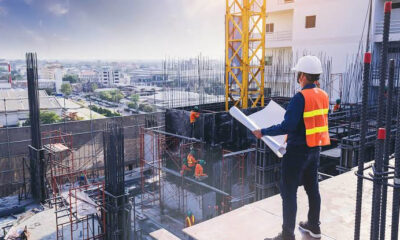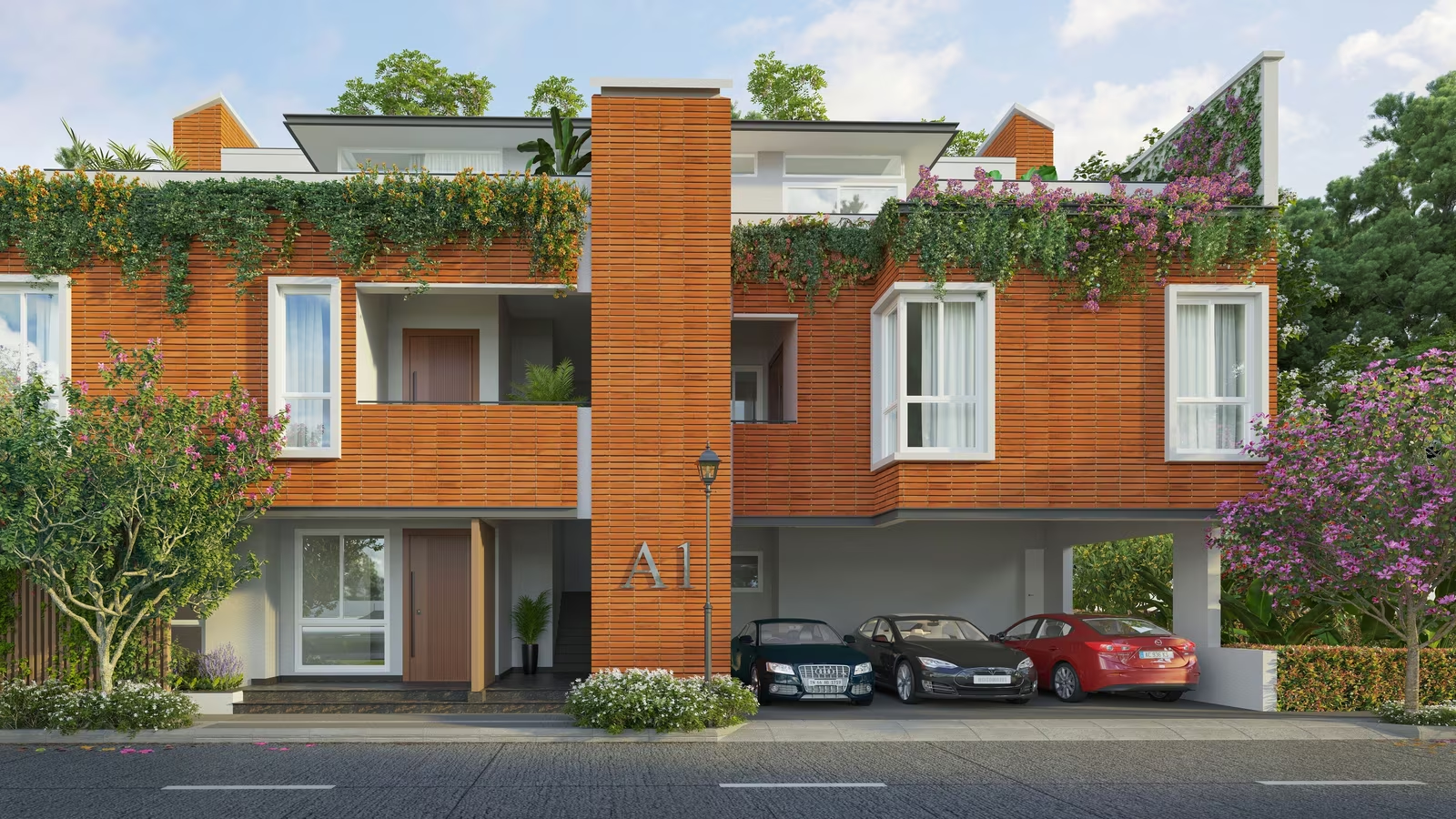News
Interim Budget 2024: Real Estate Sector Gets No Tall Announcements
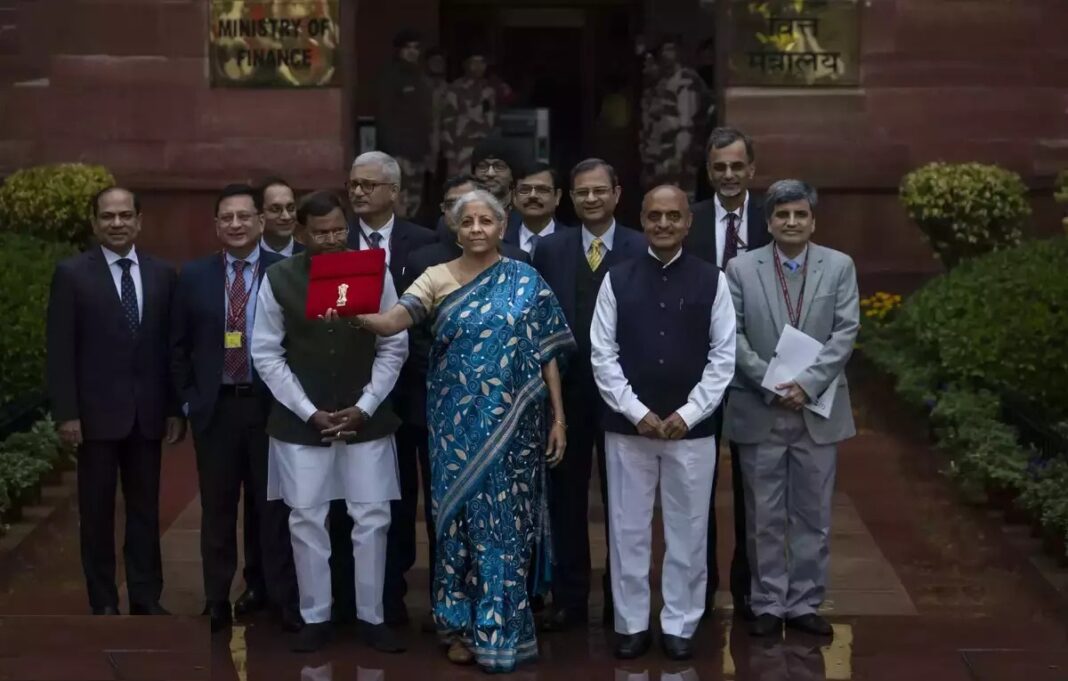

New Delhi, Feb 1, 2024: The Union Interim Budget 2024 had no Multistoried skyscraper announcements for the real estate sector. The realty industry, after the budget, can take solace from the fact that, the infrastructure focus of the Government will continue to benefit the sector.
While most of the demand of the realty sector like industry status, increase in home loan interest cap for IT exemption, single-window clearance, etc., remained unmet, some of the announcements by Finance Minister Nirmala Sitharaman in her budget speech, that are likely to impact the real estate sector, directly and indirectly, are:
- 2 crore additional houses to be taken up in the next five years under PM Awas Yojana (Gramin)
- New scheme to be launched for the middle class, living in rented houses or slums, or chawls and unauthorized colonies, to buy or build their own houses. This is likely to free encroachment areas like slums for easier redevelopment.
- ToD (Transit Oriented Development) in urban areas to boost housing demand in cities
- Hike in Capex outlay allocation to unlock the potential for realty development across assets as a major part of this allocation will be used for various infra upgrades and new projects.
- Extending tax benefit for startups for another year to boost demand for office spaces
Realty & More spoke to a cross section of realty stalwarts to know their reactions to the budget:


Manoj Gaur, CMD Gaurs Group and President CREDAI NCR
The announcements in the budget focus on infrastructure development. This budget takes India’s growth story forward. It definitely promotes infrastructure development. The measures taken by the government in the last few years have propelled Crores of people out of the poverty line. These people will need better housing. In the end, it will benefit the real estate sector. It is also a relief that no new tax has been imposed. Inflation is also under control, and the economy is on the fast track of growth. Under these circumstances, the real estate sector believes the current budget will aid its growth.


G Hari Babu, National President of NAREDCO, said,
“We commend the government’s visionary approach in crafting a comprehensive roadmap for Vikasit Bharat, emphasizing governance, development, and performance. This budget perfectly aligns with our vision of fostering a progressive and inclusive India. The government’s commitment to housing development through the Pradhan Mantri Awas Yojana – Gramin is laudable, with the announcement of 2 crore additional houses reflecting a dedicated effort to improve citizens’ lives and address rural housing challenges. Further, the reiteration of a new scheme for the urban middle class population, also would boost confidence of both the common man and the real estate sector. We now look forward for a clear roadmap of this scheme. The announcement in the budget regarding the withdrawal of pending income tax demands, particularly for amounts up to ₹25,000 for the period up to the financial year 2009-10 and up to ₹10,000 for financial years 2010-11 to 2014-15, is a welcome move”.


Aditya Kushwaha, CEO and Director Axis Ecorp
“While the interim budget did not feature substantial announcements specifically addressing the real estate industry, we acknowledge the government’s broader vision outlined for ‘Viksit Bharat.’ The notable announcement was the revised fiscal deficit estimate at 5.8% of GDP, underscoring a commitment to fiscal responsibility and the cultivation of a stable economic environment.
Moreover, the budget’s focus on promoting tourism is promising, holding the potential to greatly benefit the real estate and hospitality industry by opening up new avenues for growth and investment”.


Anuj Puri, Chairman – ANAROCK Group
As anticipated, the Interim Budget 2024 made no big-bang announcements, but it continued its focus on infrastructure upgrades and building connectivity across the country. This will benefit real estate growth in not just the top cities but in Tier 2 & 3 cities across the country.
Development of iconic tourist centres is likely to favourably impact the hospitality sector with hotels and restaurants across categories. Moreover, long-term loans proposed to states for tourism.
While the interim budget didn’t directly address the real estate sector’s key demands, the upcoming Union Budget might hold more concrete measures addressing industry concerns and potentially impacting market trends.


Yash Miglani, MD, Migsun Group
We welcome the government’s budget and are anticipating a positive response from the real estate sector. With the continued focus on the development of tier-2 and tier-3 cities, the government has enhanced the growth of these regions with the construction of airports and other connectivity modes to improve accessibility and visibility. This trend is expected to bring a further boom in real estate investments with increasing disposable income of prospective buyer.


Vikas Bhasin, Chairman & Managing Director, Saya Group
The increase in the capital expenditure by 11% will surely enhance growth in the market. Also, the plans to promote Namo Bharat will also bring ease in connectivity among various cities, increasing the demand for property investments. The advent of metro rail and rapid rail has already been attracting massive investors and the trend is expected to continue over the next few years as well. Commercial real estate’s development would stay on the upward trajectory with the positive environment created by these factors.


Prateek Mittal, Executive Director, Sushma Group
The budget’s announcement of housing provisions for middle-class renters is poised to invigorate real estate development in Tier 2 and 3 cities. An increase in CAPEX and a fillip to Gatishakti will aid infrastructure expansion, stimulating further growth in the real estate sector. Moreover, allocating a 1 lakh crore corpus for long-term, low or interest-free loans spanning 50 years will foster growth in technology-driven sunrise sectors. This is a commendable step, promising to propel innovation and economic advancement and boost the commercial realty segment’s growth.


Vidush Arya, Head – Strategy, Orris Group
We welcome the budget and anticipate a positive response from the real estate sector. It is promising that a 1 lakh crore corpus is being announced for a long-term, 50-year loan with low or no interest to support tech-savvy growth in the emerging sectors. This action would boost construction activity, which is good for real estate development in metro cities.


Salil Kumar, Director Sales and Marketing, CRC Group
We applaud the government’s budget and hope the real estate sector will respond favourably. The budget for infrastructure will increase by 11%, which will undoubtedly speed up growth. Since the government has announced stability in the income tax slab, prospective buyers are expected to showcase a continued interest in the real estate sector. With ample focus on infrastructural projects such as metro and rapid rail, the connectivity would also contribute to the overall development.


Amit Modi, Director County Group
It was expected by the Government to be fiscally prudent given that it was an interim budget, but what has been a welcome surprise is the government’s continuous importance towards PM Awas Yojana Rural whereby 2 crore more houses will be taken up in the next five years to meet the requirement arising from the increase in the number of families.
We also appreciate governments announcement to provide housing for middle-class to realise their dream of owning their own home and eagerly look forward to the finer details towards this cause.
Real Estate industry has been at the forefront of job creation and skill development, so we welcome the proposed measure to promote skill development and create 55 lakh new job opportunities for the youth.


Surender Kaushik, MD, Aryan Realty Infratech Pvt Ltd
The 11% surge in the infrastructure budget signals a promising future. The government’s decision to stabilize the income tax bracket not only instills confidence but also amplifies the trust of potential buyers in the real estate market, laying the foundation for a resilient and strong realty landscape.


Rajesh K. Saraf, Managing Director, Axiom Landbase
We wish to convey our thanks to the Honorable Minister for unveiling the 6th budget. The provision of Rs 1 lakh crore for a 50-year long-term low or interest-free loan to foster technological innovation in emerging industries is a commendable move. This measure not only enhances the competitive position of the private sector but also stimulates construction activity, thereby contributing to the growth of real estate in significant urban hubs.


Ankush Kaul, Chief Business Officer, Ambience Group
The increased spending proposed by the government on infrastructure will add to the country’s general economic prosperity and drive the demand for residential, commercial and retail spaces. The increase in CAPEX will provide a fillip to the infrastructure development, and lead to real estate development.


Nayan Raheja of Raheja Developers
The increased spending on infrastructure, while on the one hand, increasing prosperity, will also boost economic prospects, which will encourage both the housing and commercial realty segments. Further, increase in the CAPEX outlay for 2025, by 11.1% to 11.11 lakh crores for 2025, as announced by the Finance Minister in her budget speech are also expected to aid the growth the real estate development.


Ashwinder R. Singh, Co-Chairman, CII, NR Committee for Real Estate, CEO Residential at Bhartiya Urban
Commending the government’s forward-looking budget, the emphasis on affordable housing and infrastructure initiatives will ignite demand and unlock sector potential. The proposed Development Financial Institution adds a critical financing dimension. This budget sets the stage for robust growth, job creation, and a resilient infrastructure ecosystem.


Rajjath Goel, Managing Director, MRG Group
The increase in infrastructure spending is expected to improve economic prospects, which will benefit both the residential and commercial real estate markets. Additionally, the Finance Minister’s announcement of an 11.1% rise in CAPEX outlays to 11.11 lakh crores for 2025 is anticipated to support the expansion of real estate construction.


Mukul Bansal, MD, Motiaz
“The economy seems to flourish in light of the recent budget announcement. It will give the real estate sector a boost. With infrastructure spending, economic growth, and an increased emphasis on technology-driven sunrise industries, the budget is expected to stimulate real estate development in residential and commercial segments. The introduction of housing provisions for the middle class in the budget is expected to stimulate real estate development in Tier 2 and Tier 3 cities.”


Vikas Garg, Joint Managing Director, Ganga Realty
The Interim Budget 2024 or Viksit Bharat Budget laid emphasis on the development of Modern Infrastructure, Geographical Inclusivity, and all-pervasive growth as the cornerstones of our rapidly growing economy. The Housing for Middle Class scheme announced by the Finance Minister which will empower the underprivileged sections to buy and build homes is a laudable move, enshrining the government’s commitment to Housing for All. This will speed up rapid urbanization and housing development in Tier 2 and 3 cities, attracting massive investments. In addition, the Budget also announced the construction of 2 crore homes in the next five years under the PM Awas Yojana- Gramin.


Dushyant Singh, Director, Orion One 32
Reverberating the idea of Aatmanirbhar Bharat, Geographical Inclusivity, and all-inclusive social justice, the Interim Budget 2024 introduced some key reforms assuring Housing for All, just and equitable distribution of resources, women empowerment in terms of ownership or co-ownership of PM-Awas Yojana homes, and raising the standards of modern infrastructure. The Budget has exhorted programs and schemes for future-ready infrastructure, urban settlements, and housing for all sections of society, causing an inevitable boom in the demand for office spaces, retail shops, and high-street commercials.


Amit Gupta, Director, Orris Infrastructure
The Government has shown its steadfast commitment to ensuring Housing for All by announcing the Housing for Middle-Class scheme and setting a new target of construction of 2 crore homes in the next five years under the flagship PM Awas Yojana-Gramin program. The Housing for Middle-Class scheme marks a watershed period in the Indian housing landscape as it will financially empower the middle class and salaried strata of society to either build or buy their own homes, underlining economic amelioration of millions of people who sap in precarious conditions of unauthorized colonies and chawls. In addition, the Rooftop Solarization scheme will also be a boon as 1 cr household will be able to obtain up to 300 units of free electricity every month, leading to the development of resource-efficient economy.


Saransh Trehan, Managing Director, Trehan Group
The Interim Budget 2024’s proclamations are coterminous with the Government’s commitment to ensure Housing for All. The Government also resolved to build 2 crore new homes in the next five years under the PM Awas Yojana- Gramin while being close to achieving its target of constructing 3 crore homes in rural areas and countryside. In its entirety, the Budget incentivized and introduced many pro-people programs that will encourage millions of people to invest in real estate assets, especially in Tier 2 and 3 hubs due to the impetus given to strengthening of modern infrastructure and transport.


Shiven Vikram Bhatia, Executive Director, Splendor Group
Outlining the goal of achieving the status of Viksit Bharat by 2047, the Interim Budget 2024 has incentivized the idea of Housing for All by initiating pro-people measures and ramping up modern infrastructural quality, which will invariably increase the demand for office spaces and retail assets in metro cities and nearby towns. As per a CBRE report, retail space leasing activity has shot up by 48% across eight major cities including NCR in 2023 in shopping malls and high street locations. The Budget has also given unequivocal importance to uplifting the standards of modern infrastructure to boost national growth and promote growth-inducive factors, that will concomitantly pace up demand and sales of commercial and retail projects in newly developing corridors and realty zones.


Arvind Singh, Managing Director, Krasa Group
By advocating the philosophy of ‘Prosperous Bharat in harmony with nature’ and ‘First Developed India’, the Interim Budget 2024 presented by the Finance Minister announced Housing for Middle-Class scheme, Rooftop Solarization, and a new target of PM Awas Yojana-Gramin promising construction of 2 crore homes in the next five years. The idea of Modern Infrastructure and Geographical Inclusivity upheld in the Budget will usher in growth and systematic progress not only in metropolitan regions but also in Tier 2 and 3 realty zones. The demand for office and retail spaces is on a meteoric rise, which will increase manifold after the implementation of the reforms on the grass root level.


Vasudev Garg, Director, Rajdarbar Realty
Ensuring Housing for All was the central theme of the Interim Budget 2024 undergirding profound steps taken in the course of attainment of this objective. The Finance Minister announced a new eponymous scheme called ‘Housing for Middle Class’ under which the government will, through willful measures, assist middle-class and low-income groups in constructing or purchasing their homes and help them accomplish their dream of home ownership. Additionally, the Government has also resolved to build 2 crore new homes in rural regions and villages under PM Awas Yojana-Gramin in the next five years. While giving 70% of houses under PM Awas Yojana in rural areas to women who are either sole or joint owners, the Government in its effort to ensure all-round social justice and equitable distribution of resources, has received plaudit from one and all.


Surinder Singh, Director, GLS Group
The Housing for Middle-Class scheme is one of the landmark announcements of the Interim Budget 2024 speech eloquently articulated by Finance Minister Nirmala Sitharaman. The Government endorsed its fundamental idea of providing Housing for All through this scheme underlining that it will aid middle-class and salaried gentry to realize their homeownership dreams through financial assistance and means. It will also reduce the count of unauthorized colonies, makeshift homes, and chawls as the Amrit Kaal will see millions of people getting their autonomous houses. Apart from this, the Rooftop Solarization scheme and pledge to construct 2 crore new homes in rural areas under the PMAY-Gramin will also be instrumental in ensuring ‘all-round, all-pervasive, and all-inclusive’ growth and social progress.


Anurag Mathur, CEO, Savills India
“The interim budget for 2024-2025 prioritises the vision of ‘Viksit Bharat’ by 2047, focusing on socio-economic growth and supporting next-generation reforms in an aspirational economy. The budget places a strong emphasis on infrastructure development and innovation while addressing the housing shortage problem for both rural and urban populations. It includes targeted measures for 2 crore housing units for rural areas and a plan for a special scheme to support the middle class in owning a house. This will drive the next phase of residential demand, which bodes well for the real estate sector.
The government’s focus on boosting infrastructure under the PM Gati Shakti scheme is likely to optimise multi-modal connectivity, enhance logistics efficiency and reduce costs. The emphasis on accelerating green innovation involves swift expansion and fortification of the electric vehicle ecosystem, boosting manufacturing, developing charging infrastructure and providing incentives for the sector. These initiatives are expected to generate more employment opportunities.” –


Shrinivas Rao, FRICS, CEO, Vestian
The budget aimed to increase revenue and decrease borrowings by keeping the fiscal deficit at 5.1% for 2024-25, adhering to the long-term target of 4.5% by 2025-26.
Infrastructure outlay increased by 11.1% to INR 11.11 lakh crore which would be 3.4% of the GDP. This will indirectly infuse growth in the real estate sector. Furthermore, a boost in sustainable development is expected to catalyze the momentum of green development across the country, including the real estate sector. The construction sector and hospitality industry were also in focus with several announcements in the budget.


Amit Goyal, Managing Director, India Sotheby’s International Realty
The government’s focus on affordable housing, with the announcement of a special scheme for those living on rent, is anticipated to contribute to the overall growth of the real estate sector. The proposed scheme will contribute to more housing developments in the country, boosting the real estate landscape to newer heights. Moreover, with new financing and entrepreneur-friendly policies, India will witness more people becoming high-net-worth individuals, hence more likely to invest in real estate.


Anshuman Magazine, Chairman & CEO – India, South-East Asia, Middle East & Africa, CBRE
“The proposal to add 2 crore additional houses under the PM Awas Yojana (Gramin) over the next 5 years is likely to enable growth in the rural areas. Further, the announcement on housing for middle class for deserving sections would propel the development of real estate and construction activities along with allied sectors.
Emphasis on developing tourism in the country is an excellent initiative. With this, numerous tier 2 and tier 3 cities will witness economic development which will further help the overall economy. The proposal to address the emerging fervour for domestic tourism with announcements of projects for port connectivity, tourism infrastructure, and amenities will also help in generating employment. Additional emphasis on continued development of airports, will drive more opportunities for the sector.”


Dhruv Agarwala, Group CEO, REA India (Housing.com, Proptiger.com and Makaan.com)
“The soon-to-be-launched housing scheme, aimed at supporting the middle-class in owning their homes, is poised to be a significant boost to the housing sector in a country where an increasing number of people are entering this income category each day. Industry estimates suggest that India’s middle-class is set to nearly double to 61% of the total population by 2047, up from 31% in 2020-21.
Allocating 3.4% of the GDP to targeted initiatives will yield widespread benefits across various sectors. In the short-to-medium term, Tier-II and Tier-III cities can anticipate increased economic activity due to these concerted efforts.”


Puneet Chandra, Co-founder & director, Skootr
“The budget 2024 provided a strong vision for Viksit Bharat. Announcement of transit oriented development in urban areas may give a boost to cultivating infrastructural and industrial growth in India leading to economic prosperity. The commercial office real estate has been a prospering investment class in India. Reduction in stamp-duty duty for commercial real estate, offering single-window clearance and reduced GST on leasing would have added a boost in the industry.”


Arjunpreet Singh Sahni, Executive Director, Solitaire Group
The budget’s provisions for affordable housing and infrastructure development align with industry expectations. However, granting Industry Status to the real estate sector, a long-awaited demand, could have further stimulated growth. While we appreciate the measures taken in this budget, we believe that more can be done to provide a significant impetus to the real estate sector with additional incentives and policy support for developers and homebuyers. We look forward to the effective implementation of the measures outlined in the budget and hope to see positive outcomes percolate to all stakeholders of the real estate sector.”
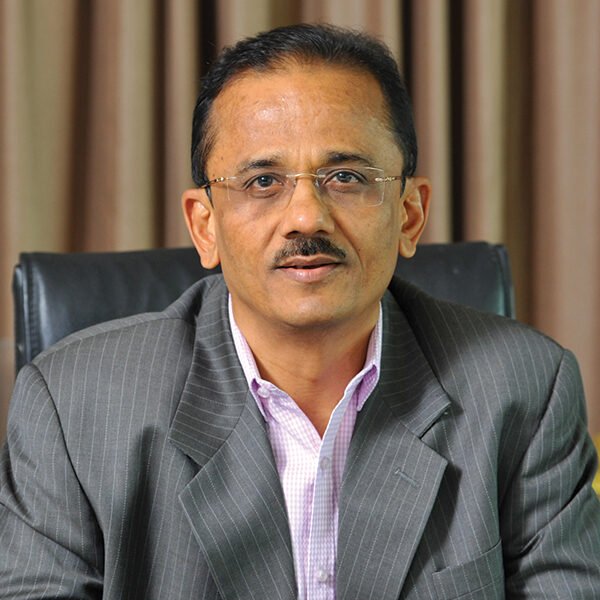

Ashwin Sheth, CMD, Ashwin Sheth Group
“We acknowledge the strategic direction outlined in the 2024 interim budget, particularly its focus on reinforcing the affordable housing sector through the increased allocation for the Pradhan Mantri Awas Yojana (PMAY). The allocation of 70% of PMAY houses to women in rural areas is of special significance and will go a long way towards providing secure living spaces and advancing women empowerment. The progress in the implementation of PM Awas Yojana (Grameen), approaching the target of three crore houses, with a commitment to taking up construction of two crore additional houses over the next five years, reflects the government’s dedication to meet the growing demand for housing in rural areas.
Moreover, the increased outlay for infrastructure to Rs 11.11 lakh crores in FY25, is a welcome move, giving further support for overall growth and development in the sector.”


Manas Mehrotra, Founder, 315Work Avenue
Continuing its focus on infrastructure development and enhanced capital expenditure, the Interim Budget 2024 had few indirect measures to support the growth of coworking sector, which has witnessed tremendous growth in recent times. The establishment of a corpus of Rs 1 lakh crore with a 50-year interest free loan will give massive push to businesses and private sector. This will indirectly lead to the growth of coworking sector as it will encourage private sectors to scale up research and innovation significantly in sunrise domains. A significant push to infrastructure will help in faster establishment of coworking spaces in non-metro cities as well. While these are few indirect measures, the budget could have done much more to give a boost to the sector. Taking into consideration the popularity of hybrid working, we have a few expectations around GST and taxation that can further accelerate growth of this industry.


Piyush Bothra, Co-Founder and CFO, Square Yards
The government’s announcement regarding the construction of an additional 20 million homes under the Pradhan Mantri Awas Yojana- Rural (PMAY) underscores its commitment to promoting inclusivity and ensuring ample living accommodations for all. This initiative is poised to significantly elevate housing standards in rural areas, catalyzing growth in the housing sector within these regions. Furthermore, the pledge to introduce a housing scheme specifically catering to deserving sections of the middle class, currently residing in rented houses, slums, chawls, or unauthorized colonies, represents a significant stride towards providing a sense of security and pride. Enabling these individuals to purchase or build their own homes not only fulfills their dreams but also contributes to fostering a stronger and more resilient community.


Badal Yagnik, Chief Executive Officer, Colliers India
The continued emphasis on green growth, particularly through the promotion of electric public transport and charging infrastructure development, further positions India on the path of sustainable and environmentally conscious real estate development. At the same time, the government’s persistent emphasis on affordable housing unveils a myriad of opportunities for residential developers, as they position themselves to make substantial contributions, aligning with the broader vision of inclusive and accessible living. Amid positive market synergies in the form of stable interest rates, attractive incentives and increased affordability, domestic investors too are likely to resonate upbeat confidence towards all real estate segments.
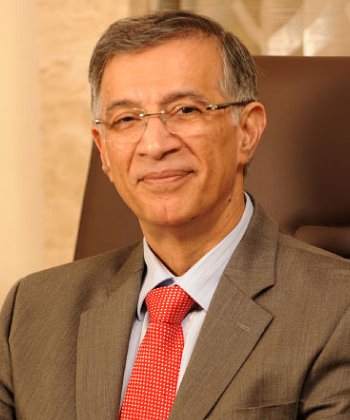

Dr Niranjan Hiranandani, Founder, Hiranandani Group and Chairman, National Naredco
“Hon’ble FM decoded an integrated and equitable growth budget outlay encompassing significant social reforms, enhancing economic growth value chain, emphasize of sunrise sectors and impetus to urban & rural housing with mega infrastructure projection. India has risen in its global leadership by paving the way for world economies, setting new standards, establishing strong geo-political allies and corroborating address geoeconomic vagaries.
The enhancement in infrastructure outlay by 11% will bode well for firming up the growth of residential, commercial and industrial real estate asset classes across the geographies. The augmentation of multi-modal corridor connectivity with new railway corridors, and doubling of airports and ports corridors will have a multiplier effect on the real estate landscape.
The extension of the PMAY scheme for rural areas is in accordance with the objective of Housing for all laid by the Hon’ble PMO. A focused direction is set for addressing the housing deficit needs of the urban poor with the buy or build house motto. The continual skilling & Upskilling of the working populace will help the sector gain a competitive advantage and increase direct as well as indirect employment opportunities. Therefore, India’s vision for Amrit Kaal is stated very clearly and thus the country is on track to becoming Vikshit Bharat by 2047.”


Aman Sarin, Chief Executive Officer, Anant Raj Limited
The Finance Minister unveiled a comprehensive, development focused and inclusive budget, providing a boost to both urban and rural housing. The extension of the PMJAY scheme to rural areas and plans to launch a scheme to help the Middle Class “living in rented houses to buy or build their own houses aligns seamlessly with the PM’s Housing for All initiative.
The announcement of an 11% increase in the infrastructure outlay is poised to positively impact the growth of all segments within the Real estate sector, including Residential, Commercial, and Industrial developments countrywide.


Amrita Gupta, Director of Manglam Group and Founder President, CREDAI Rajasthan Women’s Wing
“The interim budget’s dedicated focus on women empowerment signals a progressive stride towards inclusivity and gender equality. With increased Mudra Yojana loans to women and increasing participation in higher education and STEM courses, the government is working towards uplifting women economically and socially. Moreover, the augmentation of the Housing for All Scheme, coupled with robust investment in infrastructure, heralds a new era of opportunity and development across urban and rural landscapes. Emphasis on spiritual tourism and development in regions like Lakshadweep breathes new life into the real estate sector. The estimated fiscal deficit at 5.1% in 2024-25 highlights a prudent approach towards economic management, which augurs well for the real estate industry. As India strides confidently towards its vision of Amrit Kaal and Viksit Bharat by 2047, the real estate sector stands as a cornerstone of prosperity, driving inclusive growth and shaping the destiny of a resurgent nation”.


Aman Sharma, Founder and Managing Director, Aarize
“We appreciate the government’s commitment to inclusive development, which is particularly evident in the housing scheme for the middle class. The plan to construct an additional 20 million homes in the next five years under the PMAY-Rural scheme reflects their concerted effort to address the surging demand for housing. Furthermore, the government is focusing on developing infrastructure by expanding ongoing airport projects and strategically developing new ones to improve connectivity across cities, especially non-metros. These announcements made in the budget reflect the government’s forward-looking approach to contribute significantly to the nation’s growth.”
Another key driver propelling economic growth is the government’s steadfast commitment to enhancing infrastructure and connectivity nationwide. In the short-to-medium term, Tier-II and Tier-III cities are anticipated to experience heightened economic activity, courtesy of these concerted efforts. India’s infrastructure industry had been eagerly awaiting a comprehensive plan and timeline for bolstering infrastructure in the country, and the Interim Budget delivered on these expectations. The continued focus on capital expenditure (capex) at around 3.4% of GDP emerges as a catalyst for economic activity, aligning with the long-term vision of a ‘Viksit Bharat’ (Developed India).
-



 News4 weeks ago
News4 weeks agoKW Delhi 6 Mall Onboards New Brands
-



 News4 weeks ago
News4 weeks agoManasum Senior Living Launches IKIGAI GOA, A Senior Living Community in North Goa, in collaboration with Prescon Homes
-



 News4 weeks ago
News4 weeks agoBridging India Divide: Top 5 Tier- 2 Cities to Focus On
-



 News4 weeks ago
News4 weeks agoCommercial Realty Gets Tech Savvy: Fast Construction, Enhanced Convenience
-



 News3 weeks ago
News3 weeks agoGodrej Properties Sells Rs 3k cr+ Homes of Godrej Zenith, Gurugram, within 3 days
-



 News3 weeks ago
News3 weeks agoRBI’s Status Quo on Key Policy Rates to Help Maintain the Real Estate Growth Momentum, Say Industry Stalwarts
-



 News4 weeks ago
News4 weeks agoMultipoint Connection – A Definite Boon
-



 News2 weeks ago
News2 weeks agoOlive Announces Dhruv Kalro as Co-Founder







